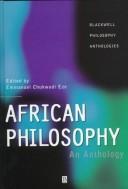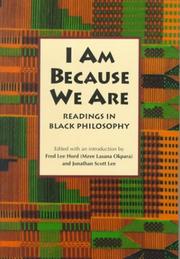| Listing 1 - 5 of 5 |
Sort by
|

ISBN: 1135958815 1280406984 0203900103 9780203900109 9780415926454 0415926459 9780415926461 0415926467 9781280406980 0415926459 0415926467 9786610406982 6610406987 9781135958817 9781135958763 9781135958800 1135958807 Year: 2000 Publisher: New York (N.Y.): Routledge,
Abstract | Keywords | Export | Availability | Bookmark
 Loading...
Loading...Choose an application
- Reference Manager
- EndNote
- RefWorks (Direct export to RefWorks)
Paget introduces the general reader to Afro-Caribbean philosophy in this ground-breaking work. Since Afro-Caribbean thought is inherently hybrid in nature, he traces the roots of this discourse in traditional African thought and in the Christian and Enlightenment traditions of Western Europe.
Philosophy, Black --- Philosophy. --- Mental philosophy --- Humanities --- Black philosophy --- Afro-Caribbean cults --- Philosophy --- Philosophy, Black - West Indies --- Afro-Caribbean cults - Philosophy --- West Indies. --- Karibik. --- Westindien. --- Schwarze.

ISBN: 0631203370 0631203389 9780631203377 9780631203384 Year: 1998 Volume: 5 Publisher: Malden (Mass.) : Blackwell,
Abstract | Keywords | Export | Availability | Bookmark
 Loading...
Loading...Choose an application
- Reference Manager
- EndNote
- RefWorks (Direct export to RefWorks)
Philosophy, African. --- Philosophy, Black. --- African philosophy --- Afrikaanse filosofie --- Afrikaanse wijsbegeerte --- Black philosophy --- Filosofie [Afrikaanse ] --- Filosofie [Neger] --- Negerfilosofie --- Philosophie africaine --- Philosophie noire --- Philosophy [African ] --- Philosophy [Black ] --- Wijsbegeerte [Afrikaanse ] --- Philosophy --- Africa --- Philosophy, African --- Philosophy, Black
Book
ISBN: 1613763735 9781613763735 9781625341761 9781625341754 162534175X 1625341768 Year: 2016 Publisher: Amherst
Abstract | Keywords | Export | Availability | Bookmark
 Loading...
Loading...Choose an application
- Reference Manager
- EndNote
- RefWorks (Direct export to RefWorks)
First published in 1995, I Am Because We Are has been recognized as a major, canon-defining anthology and adopted as a text in a wide variety of college and university courses. Bringing together writings by prominent black thinkers from Africa, the Caribbean, and North America, Fred Lee Hord and Jonathan Scott Lee made the case for a tradition of "relational humanism" distinct from the philosophical preoccupations of the West.Over the past twenty years, however, new scholarly research has uncovered other contributions to the discipline now generally known as "Africana philosophy" that were not included in the original volume. In this revised and expanded edition, Hord and Lee build on the strengths of the earlier anthology while enriching the selection of readings to bring the text into the twenty-first century. In a new introduction, the editors reflect on the key arguments of the book's central thesis, refining them in light of more recent philosophical discourse. This edition includes important new readings by Kwame Gyekye, Oyeronke Oy ewumi, Paget Henry, Sylvia Wynter, Toni Morrison, Charles Mills, and Tommy Curry, as well as extensive suggestions for further reading.
Philosophy, Black. --- Social groups --- Identity (Philosophical concept) --- Blacks --- Black philosophy --- Association --- Group dynamics --- Groups, Social --- Associations, institutions, etc. --- Social participation --- Identity --- Philosophy --- Comparison (Philosophy) --- Resemblance (Philosophy) --- Black identity --- Blackness (Race identity) --- Negritude --- Race identity of blacks --- Racial identity of blacks --- Ethnicity --- Race awareness --- Philosophy. --- Race identity. --- Race identity of Black people --- Racial identity of Black people --- Black persons --- Negroes --- Ethnology --- Black people --- Philosophy, African.
Book
ISBN: 1503605728 9781503605725 0804798702 1503605736 9781503605732 9780804798709 Year: 2018 Publisher: Stanford, California
Abstract | Keywords | Export | Availability | Bookmark
 Loading...
Loading...Choose an application
- Reference Manager
- EndNote
- RefWorks (Direct export to RefWorks)
Frantz Fanon may be most known for his more obviously political writings, but in the first instance, he was a clinician, a black Caribbean psychiatrist who had the improbable task of treating disturbed and traumatized North African patients during the wars of decolonization. Investigating and foregrounding the clinical system that Fanon devised in an attempt to intervene against negrophobia and anti-blackness, this book rereads his clinical and political work together, arguing that the two are mutually imbricated. For the first time, Fanon's therapeutic innovations are considered along with his more overtly political and cultural writings to ask how the crises of war affected his practice, informed his politics, and shaped his subsequent ideas. As David Marriott suggests, this combination of the clinical and political involves a psychopolitics that is, by definition, complex, difficult, and perpetually challenging. He details this psychopolitics from two points of view, focusing first on Fanon's sociotherapy, its diagnostic methods and concepts, and second, on Fanon's cultural theory more generally. In our present climate of fear and terror over black presence and the violence to which it gives rise, Whither Fanon? reminds us of Fanon's scandalous actuality and of the continued urgency of his message.
Philosophy, Black. --- Philosophy, West Indian. --- Black race --- Imperialism --- Colonialism --- Empires --- Expansion (United States politics) --- Neocolonialism --- Political science --- Anti-imperialist movements --- Caesarism --- Chauvinism and jingoism --- Militarism --- Negro race --- Race --- West Indian philosophy --- Black philosophy --- Philosophy. --- Fanon, Frantz, --- Fānūn, Frānz, --- פנון, פרנץ, --- فانون، فرانتس --- فانون، فرانز --- فانون، فرانس --- Faanon, Faraanz,

ISBN: 1122054106 0585142092 9780585142098 0870239643 0870239651 Year: 1995 Publisher: Amherst University of Massachusetts press
Abstract | Keywords | Export | Availability | Bookmark
 Loading...
Loading...Choose an application
- Reference Manager
- EndNote
- RefWorks (Direct export to RefWorks)
Blacks --- Identity (Philosophical concept) --- Social groups --- Philosophy, Black. --- Philosophy, Black --- History & Archaeology --- Regions & Countries - Africa --- Black philosophy --- Association --- Group dynamics --- Groups, Social --- Associations, institutions, etc. --- Social participation --- Identity --- Philosophy --- Comparison (Philosophy) --- Resemblance (Philosophy) --- Black identity --- Blackness (Race identity) --- Negritude --- Race identity of blacks --- Racial identity of blacks --- Ethnicity --- Race awareness --- Race identity. --- Philosophy. --- Race identity --- Race identity of Black people --- Racial identity of Black people --- Black persons --- Negroes --- Ethnology --- Black people
| Listing 1 - 5 of 5 |
Sort by
|

 Search
Search Feedback
Feedback About UniCat
About UniCat  Help
Help News
News